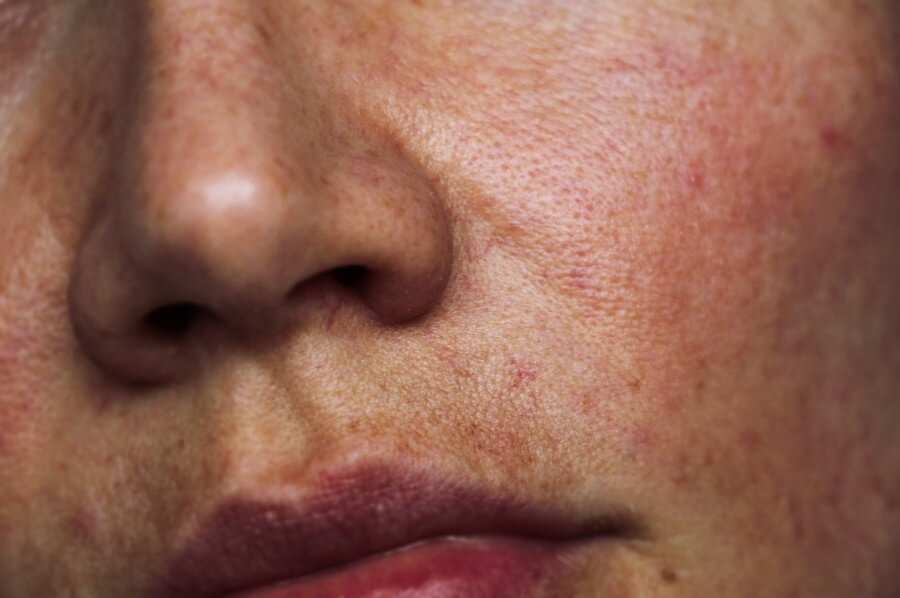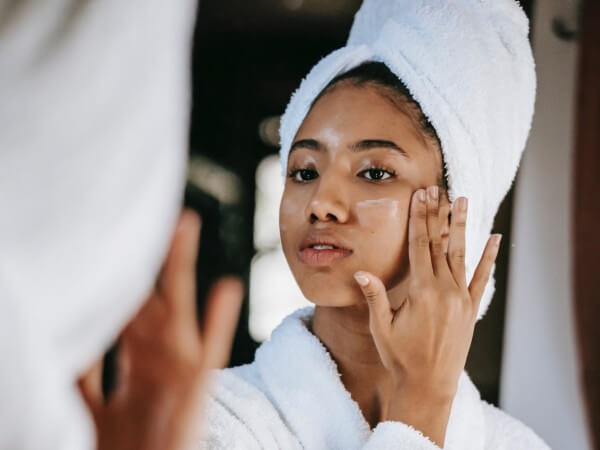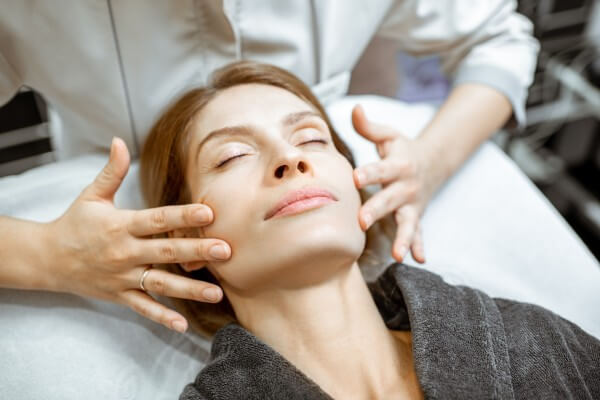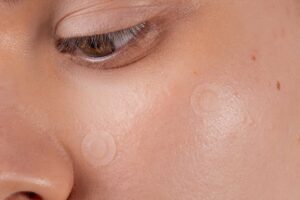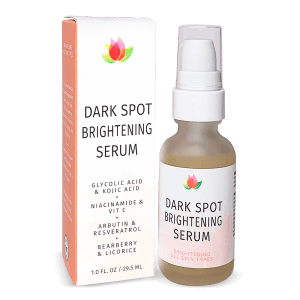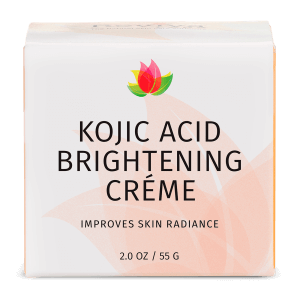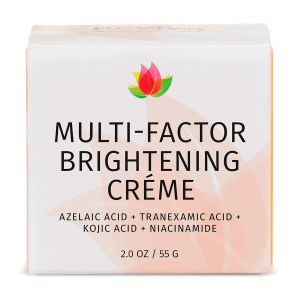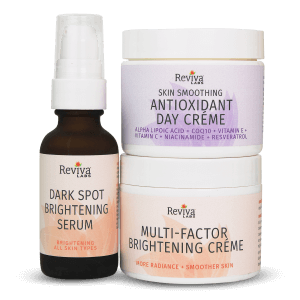Ingredients, Reviva Labs, Skin Care
Say Goodbye to Dark Spots with Reviva’s Dark Spot Brightening Serum
Everyone desires a flawless complexion. However, dark spots and uneven skin tone often stand in the way. Fortunately, the skincare industry has made significant strides, offering potent solutions like Reviva’s Dark Spot Brightening Serum. This product boasts an impressive list of eight brightening ingredients, including the primary ingredient, Niacinamide and seven other time-tested brightening ingredients.
What is Niacinamide?
Niacinamide, also known as nicotinamide, is a form of vitamin B3. It’s a powerhouse skincare ingredient recognized for its multiple benefits, including its ability to brighten skin and improve its overall health.
The Power of Niacinamide in Reviva’s Dark Spot Brightening Serum
Niacinamide is a key player in Reviva’s Dark Spot Brightening Serum. It makes up 5% of the serum’s formula, providing significant benefits to the skin. Here’s how:
Skin Brightening
Niacinamide is known for its skin-brightening properties. It helps to fade dark spots and even out skin tone, revealing a more radiant complexion.
Anti-Acne
Niacinamide also has anti-inflammatory properties, which can help reduce the redness and swelling often associated with acne.
Moisturizing
Niacinamide can improve the skin’s barrier function, helping it to lock in moisture. This results in plumper, smoother skin.
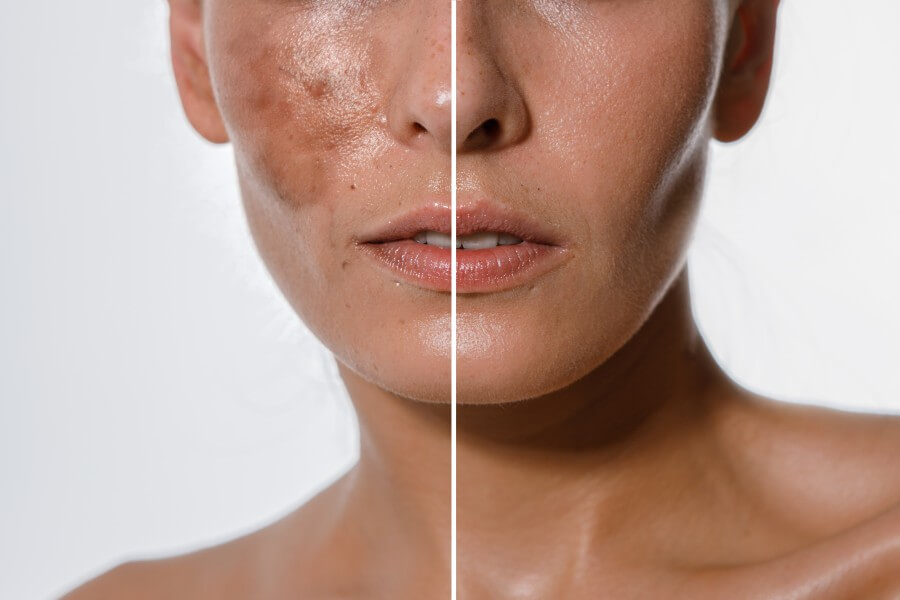
The Other Seven Brightening Ingredients
In addition to Niacinamide, Reviva’s Dark Spot Brightening Serum features seven (7) other brightening ingredients that have a long history of helping to improve skin radiance:
1. Glycolic Acid
Glycolic Acid, often referred to as an alpha-hydroxy acid (AHA), is a powerful skincare ingredient renowned for its remarkable exfoliating properties. This clear, water-soluble substance has become a staple in the world of dermatology and skincare due to its ability to transform the complexion and bestow a rejuvenated and radiant appearance upon the skin.
This potent AHA works its magic by delicately but effectively removing the outermost layer of dead skin cells, a process known as exfoliation. By dissolving the bonds that hold these lifeless skin cells in place, glycolic acid unveils the underlying, fresh skin that is waiting to shine. As a result, the skin takes on a renewed and more youthful appearance, with improved texture and a smoother, softer feel.
The exfoliation facilitated by glycolic acid is not just skin-deep; it also extends to the deeper layers of the skin, where it can stimulate the production of collagen and elastin, two vital proteins responsible for maintaining skin elasticity and suppleness. This boost in collagen and elastin production can aid in reducing the appearance of fine lines and wrinkles, making glycolic acid a popular choice for individuals seeking anti-aging benefits.
Furthermore, the exfoliation process can help address a variety of skin concerns, including acne, uneven skin tone, and the fading of dark spots and hyperpigmentation. By encouraging the turnover of skin cells, glycolic acid helps to unclog pores, prevent breakouts, and fade post-inflammatory hyperpigmentation, resulting in a clearer, more even complexion.
2. Kojic Acid
Kojic Acid, a remarkable natural compound, stands as a potent antioxidant in the realm of skincare, celebrated for its ability to address a range of common skin concerns, including the reduction of visible sun damage, age spots, and scars. Derived from various fungi, particularly Aspergillus oryzae, and present in certain foods like soy sauce and rice wine, Kojic Acid has found its place as a prized ingredient in the skincare industry due to its impressive skin-brightening properties.
One of the key attributes of Kojic Acid is its capacity to inhibit the production of melanin, the pigment responsible for the coloration of the skin. By interfering with the enzymatic process that governs melanin synthesis, Kojic Acid helps to gradually fade areas of hyperpigmentation caused by excessive sun exposure, age-related skin changes, or post-inflammatory scarring. As a result, the skin takes on a more even and radiant complexion, with these imperfections visibly diminished.
Kojic Acid’s antioxidant properties further bolster its effectiveness in combating sun damage and aging signs. As an antioxidant, it helps to neutralize harmful free radicals that can accelerate skin aging and exacerbate skin discoloration. By preventing oxidative stress, Kojic Acid supports the skin’s natural defense mechanisms, reducing the likelihood of new dark spots and maintaining a youthful appearance.
This multifaceted antioxidant doesn’t just stop at lightening skin imperfections; it can also help to brighten and refresh the overall complexion. The result is a more luminous, even toned, and rejuvenated appearance, with a reduction in the appearance of fine lines and wrinkles.
When incorporating Kojic Acid into your skincare regimen, it’s important to be consistent and patient, as the effects may take some time to become noticeable. Additionally, proper sun protection is essential when using products containing Kojic Acid, as the skin may become more sensitive to UV radiation. Wearing sunscreen and protective clothing is crucial to prevent further sun damage and maintain the positive changes achieved with Kojic Acid.
3. Arbutin
Arbutin, a naturally occurring skin lightening compound, hails from the leaves of the bearberry plant and is renowned for its ability to regulate melanin production, making it an exceptional ingredient in the realm of skincare. With its gentle yet effective approach to reducing skin discoloration and promoting a more even skin tone, arbutin has gained popularity for its potential to address hyperpigmentation, age spots, and uneven skin tone.
At the core of arbutin’s remarkable efficacy is its capacity to inhibit the enzyme tyrosinase, a critical player in the melanin production process. By curbing tyrosinase activity, arbutin helps to slow down the synthesis of melanin, the pigment responsible for the coloration of our skin. This modulation in melanin production results in a gradual lightening of dark spots and a reduction in overall skin pigmentation, which, in turn, leads to a more uniform and radiant complexion.
One of the distinct advantages of arbutin is its gentle nature, which makes it a suitable option for individuals with sensitive skin or those seeking a milder alternative to more aggressive skin lightening agents. Unlike some harsher ingredients, arbutin is less likely to cause irritation or side effects, making it a favorable choice for those looking to address skin discolorations without compromising the health and balance of their skin.
Furthermore, arbutin’s natural origin adds to its appeal, as it aligns with the growing demand for clean and natural skincare options. Its extraction from the bearberry plant exemplifies the pursuit of harnessing the power of botanical ingredients to enhance the skin’s appearance, emphasizing the importance of botanical sources in the skincare industry.
When incorporating products containing arbutin into your skincare routine, it’s important to maintain consistency and patience, as it may take some time to observe visible improvements in skin tone and pigmentation. Additionally, sun protection remains crucial when using arbutin-based products, as continued exposure to UV radiation can counteract the progress made in reducing melanin production. Therefore, wearing sunscreen and adopting sun-safe practices are integral to ensuring long-lasting and effective results.
4. Vitamin C
Vitamin C, also known as ascorbic acid, is a powerhouse skincare ingredient celebrated for its multifaceted benefits that extend far beyond its well-known role as a vital nutrient for overall health. In the world of skincare, Vitamin C shines as a potent antioxidant that plays a pivotal role in revitalizing and rejuvenating the skin.
One of the most prominent attributes of Vitamin C is its antioxidant prowess. It serves as a guardian against the destructive forces of free radicals, which are unstable molecules that can wreak havoc on the skin by causing oxidative stress. By neutralizing these free radicals, Vitamin C helps shield the skin from premature aging signs, including fine lines, wrinkles, and sagging. This protective role not only contributes to a more youthful appearance but also aids in maintaining skin health and resilience.
Vitamin C doesn’t stop at defense; it actively participates in the process of collagen production. Collagen is a fundamental protein responsible for maintaining the skin’s firmness and elasticity. As we age, collagen production naturally declines, leading to sagging and the formation of wrinkles. Vitamin C intervenes in this process by stimulating collagen synthesis, effectively enhancing the skin’s suppleness and tautness. This boost in collagen production can help to reduce the appearance of fine lines and promote a smoother, more youthful complexion.
Another remarkable attribute of Vitamin C is its ability to address hyperpigmentation, making it a sought-after remedy for uneven skin tone and dark spots. By inhibiting the enzyme responsible for melanin production, Vitamin C assists in lightening areas of hyperpigmentation and post-inflammatory discoloration. Over time, this results in a more even, radiant, and refreshed complexion.
Moreover, Vitamin C complements other skincare ingredients, such as sunscreens and moisturizers. When applied before sunscreen, it provides an additional layer of protection against UV radiation, bolstering the skin’s defenses against sun damage and UV-induced skin aging. Additionally, it enhances the efficacy of moisturizers by aiding in their absorption, ensuring that the skin remains adequately hydrated and nourished.
To reap the full benefits of Vitamin C, it’s important to incorporate it into your skincare routine consistently, as its effects become more apparent with regular use. Vitamin C can be found in various skincare products, such as serums, creams, and masks, making it accessible to a wide range of individuals with different skin types and concerns.
5. Resveratrol
Resveratrol, a natural plant compound, has gained considerable attention in the world of skincare for its remarkable antioxidant and anti-inflammatory properties, making it a valuable addition to the arsenal of ingredients designed to protect and enhance the skin.
At its core, resveratrol is a polyphenol found in various plants, most notably in the skins of red grapes and in red wine. Its antioxidant potential is a standout feature, as it serves as a guardian against free radicals, those unstable molecules that can wreak havoc on the skin. Free radicals are often generated by factors such as UV radiation, pollution, and stress, and they contribute to oxidative stress, which accelerates skin aging. Resveratrol’s ability to neutralize these free radicals helps shield the skin from their harmful effects, mitigating the appearance of fine lines, wrinkles, and other signs of premature aging. In essence, resveratrol serves as a protective shield against the ravages of time and the environment.
One of the significant advantages of resveratrol is its anti-inflammatory properties. Inflammation is a key driver of many skin issues, including redness, irritation, and conditions like acne and rosacea. Resveratrol’s calming effect on the skin helps reduce redness and soothe irritation, contributing to a more balanced and comfortable complexion. By minimizing inflammation, it supports the skin’s ability to repair and regenerate, ultimately promoting a healthier and more radiant appearance.
Moreover, resveratrol has been linked to its capacity to shield the skin from the detrimental effects of UV radiation. Sun exposure is a leading cause of skin damage, including sunburn, premature aging, and an increased risk of skin cancer. Resveratrol can act as an additional layer of defense against UV radiation, reducing the potential damage caused by the sun’s harmful rays. While it should not replace traditional sun protection measures such as sunscreen, resveratrol can provide supplementary protection against UV-induced skin damage.
Incorporating resveratrol into your skincare routine can be achieved with serums, creams, and other topical products, making it accessible to a wide range of individuals with various skin types and concerns. By doing so, you can tap into the numerous benefits of this plant compound, including its potent antioxidant and anti-inflammatory properties, which collectively help safeguard the skin’s health and appearance.
6. Bearberry
Bearberry, also known as uva-ursi, is a botanical treasure often harnessed for its potent skin-brightening properties. This plant extract has found its place in the world of skincare due to its rich content of a natural compound known as arbutin, which holds the key to its remarkable ability to lighten and brighten the skin.
Arbutin, the primary active ingredient derived from bearberry, is celebrated for its melanin-inhibiting properties. Melanin is the pigment responsible for the coloration of the skin, and overproduction of melanin can lead to issues like hyperpigmentation, dark spots, and an uneven complexion. Arbutin works by interfering with the enzymatic process that regulates melanin production, effectively slowing down this process. As a result, areas of hyperpigmentation gradually become lighter, and the overall skin tone becomes more even and radiant.
One of the notable advantages of bearberry and arbutin is their natural origin. In an era when clean and natural skincare solutions are increasingly sought after, bearberry extract aligns with the growing demand for botanical ingredients that promote skin health without compromising its balance. This natural aspect lends a sense of purity and authenticity to skincare products containing bearberry extract, making them particularly attractive to those looking for more holistic and eco-friendly skincare options.
Bearberry extract’s gentle nature makes it suitable for various skin types, including sensitive skin. It offers a milder alternative to some other skin-lightening agents, making it an excellent choice for individuals seeking to address skin discolorations without causing irritation or side effects.
When incorporating products containing bearberry extract into your skincare routine, it’s important to maintain consistency, as noticeable improvements in skin tone may take some time to become apparent. Additionally, as with many skin-brightening ingredients, it’s crucial to use proper sun protection to prevent further UV-induced skin damage, as the skin may become more sensitive when using bearberry extract.
7. Licorice Root
Licorice root, derived from the Glycyrrhiza glabra plant, has earned a well-deserved reputation in the world of skincare for its exceptional skin-soothing qualities and its remarkable ability to address uneven skin tone. This botanical extract has been cherished for centuries due to its diverse range of benefits and its positive impact on the health and appearance of the skin.
One of the standout features of licorice root is its soothing and calming properties. Skin sensitivity and redness are common concerns, and licorice root steps in as a gentle yet effective solution. Compounds found in licorice root, such as glycyrrhizic acid and flavonoids, work to alleviate skin irritations, making it a valuable ingredient for those with sensitive or reactive skin. It’s particularly useful for soothing conditions like redness, rosacea, and dermatitis. By reducing inflammation and irritation, licorice root helps the skin maintain a more comfortable and balanced state.
Another key advantage of licorice root is its ability to improve the look of an uneven skin tone. It contains glabridin, a natural skin-lightening compound that inhibits tyrosinase, the enzyme responsible for melanin production. This means that licorice root can help fade dark spots, hyperpigmentation, and redness, leading to a more even complexion and a brighter skin tone. The results are gradual but often quite significant, as the skin takes on a more luminous and youthful appearance.
Furthermore, licorice root’s anti-inflammatory properties can help with skin conditions such as acne, where inflammation plays a significant role in pimple formation. By reducing redness and calming irritated skin, licorice root can contribute to a clearer complexion.
Incorporating products containing licorice root extract into your skincare routine can be beneficial for various skin types and concerns. It is often found in serums, creams, and masks, making it accessible and versatile. Its gentle nature allows it to be used regularly without causing irritation.
To maximize the benefits of licorice root, it’s advisable to maintain a consistent skincare regimen, as results may become more noticeable over time. Additionally, proper sun protection remains crucial, especially when using skin-brightening ingredients like licorice root, to prevent further skin damage and maintain the positive changes achieved through its use.
How to Use Reviva’s Dark Spot Brightening Serum
Reviva’s Dark Spot Brightening Serum can be used alone or in conjunction with other brightening skincare products for accelerated results. Apply the serum to the face and neck twice daily, morning and night. Be sure to follow up with a moisturizer and a broad-spectrum sunscreen during the day.
Experience the Benefits of Reviva’s Dark Spot Brightening Serum
Reviva’s Dark Spot Brightening Serum is designed to help you achieve a more even and radiant complexion. The blend of eight brightening ingredients, including the superstar Niacinamide, targets the appearance of dark spots and uneven skin tone. With regular use, this serum promises brighter, healthier-looking skin.
Get Ready for a Brighter Complexion
With the power of Niacinamide and seven other potent brightening ingredients, Reviva’s Dark Spot Brightening Serum offers a solution to those battling dark spots and uneven skin tone. Integrating this serum into your skincare routine can help you say goodbye to dark spots for good.
Please note: Everyone’s skin is unique, and results may vary. Always patch test new skincare products before incorporating them into your routine.



